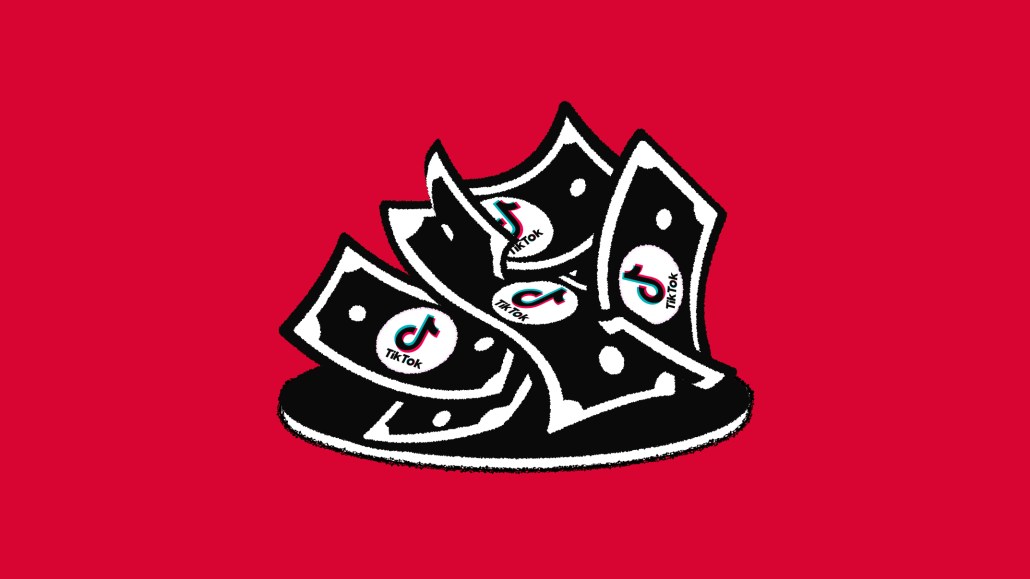Save 50% on a 3-month Digiday+ membership. Ends Dec 5.
As its future hangs in the balance, TikTok tries to keep advertisers on its side

Think TikTok is based in China? Think again. Maybe you’re a marketer who believes decisions about TikTok are made in Beijing. You’d swear that the app was inextricably linked to the Chinese government. Wrong on both counts.
In fact, the whole idea that TikTok is really spyware is nothing more than a myth, according to the app. And it wants marketers to know it. So much so that TikTok execs have been meeting up with marketers to try and dispel the so-called myths about the app’s ties to China — myths that were brought into sharp focus last week when CEO Shou Chew testified before U.S. lawmakers.
Call it damage control.
And there’s a lot to control. Some 16 myths, to be precise. All of them are featured below in the document TikTok ad execs have been sharing with marketers following the congressional hearing.
For those readers who are short on time, here’s the cliffsnotes:
- Ownership
There have long been concerns about TikTok’s ownership – namely that ByteDance is a Chinese company, and that company has ties to the Chinese Government. TikTok states that while ByteDance was indeed founded by Chinese entrepreneurs, around 60% of it is owned by institutional investors: Carlyle Group, General Atlantic and Susquehanna International Group – so it’s predominantly a private equity-backed business nowadays. And let’s not forget its five-strong board; three out of five of which are U.S. based, with the remaining two residing in Singapore and Hong Kong, respectively.
Ad position: web_incontent_pos1
- Ties to Chinese Government
It’s well known that to operate news and information products within mainland China, media licenses are required, and the Chinese Government will legally own 1% of those entities. But TikTok doesn’t operate in mainland China, only its Chinese counterpart Douyin does, so those rules don’t apply.
- Content
TikTok has always positioned itself as an entertainment app, meaning the content is predominantly UGC — not content created by the Chinese Government. And given that TikTok can’t be accessed in China, it makes sense that the app’s content moderation takes place elsewhere, by the platform’s U.S. and Ireland Trust and Safety teams, which oversee the content for the US and Europe, respectively.
- Data use (or abuse)
Ad position: web_incontent_pos2
Since Trump’s loud call to ban the app back in 2020, TikTok has touted Project Texas as its way of appeasing concerns about how user data is managed. And even at the hearing, Project Texas was used as a response to answer numerous repeated questions from Congress. But since June 2022, 100% of U.S. data has been routed to Oracle and USDU infrastructure, which is managed by, you guessed it, Americans, in the U.S..
- Surveillance
There’s an ongoing narrative that the app has the capability to spy on U.S. citizens. This was made clear when it was announced last month that the FBI and DOJ are investigating ByteDance’s use of TikTok to spy on Forbes’ journalists.
Here’s a copy of the full myth-buster document:
The fact that such a document exists says everything there is to know about where TikTok’s priorities are now: distancing itself from Beijing authorities. To be fair, this isn’t the first time those ties have dominated the political and cultural discourse. Back in 2020, former president Donald Trump ordered the ban of new downloads of the app in the U.S.
This time, however, it’s different.
Marketers are warier than ever of the geopolitical issues around TikTok. Should they act on those concerns and start pulling ad dollars from the app then it could compound what is already a very precarious situation. To be clear, this isn’t an immediate threat. Most marketers who spoke to Digiday have said they intend to keep advertising on the app. That said, mud sticks. So much so that those same marketers are keeping a watchful eye and are ready to adapt their strategies and budgets, should the situation change at any point.
Little wonder then why TikTok execs are taking steps to try and change the narrative around the business.
“The concerns we’ve heard from a handful of clients that aren’t on TikTok yet are more around not wanting to invest in the platform if it’s going to get banned,” said Adam Telian, vp of media services at New Engen.
Whatever happens next, TikTok’s ad execs are going to be doing more than debunking myths over the coming weeks. Marketers will demand it. After all, they have a lot of unanswered questions that neither the congressional hearing, the Transparency and Accountability Center or Project Texas have been able to address.
“It’s been three years since these concerns were initially raised,” said Kaela Green, vp paid social at Basis Technologies. “How long does it take? TikTok’s CEO said that they’ve spent about $1.5 billion on these efforts, that the data will be protected in this way — but why is it not [protected] right now? Why has it been deprioritized? Why aren’t we in a place where we can very confidently speak to it yet?”
More and more marketers are starting to concur. Indeed, sentiment from them toward TikTok is slowly starting to shift.
“If confidence in TikTok’s longevity is continuously undermined, brands and creators are going to start using other platforms with more frequency,” said Jess Phillips, founder and CEO of The Social Standard. “It’s a simple hedge that will be necessary.”
More in Marketing

Ulta, Best Buy and Adidas dominate AI holiday shopping mentions
The brands that are seeing the biggest boost from this shift in consumer behavior are some of the biggest retailers.

U.K. retailer Boots leads brand efforts to invest in ad creative’s data layer
For media dollars to make an impact, brands need ad creative that actually hits. More CMOs are investing in pre- and post-flight measurement.
Ad position: web_bfu



